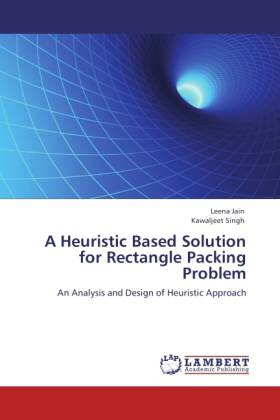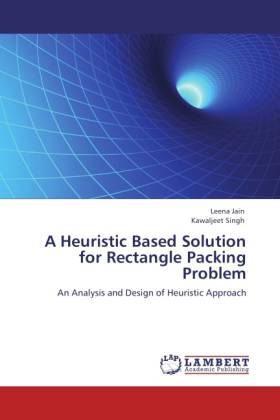
- Afhalen na 1 uur in een winkel met voorraad
- Gratis thuislevering in België vanaf € 30
- Ruim aanbod met 7 miljoen producten
- Afhalen na 1 uur in een winkel met voorraad
- Gratis thuislevering in België vanaf € 30
- Ruim aanbod met 7 miljoen producten
Zoeken
A Heuristic Based Solution for Rectangle Packing Problem
An Analysis and Design of Heuristic Approach
Leena Jain, Kawaljeet Singh
Paperback | Engels
€ 77,95
+ 155 punten
Omschrijving
This monograph investigates approaches for two-dimensional stock cutting (Rectangle Packing) problems and development of a new algorithm which brings back the revision of a classical heuristic for Rectangle Packing as proposed by Cheok and Nee. These problems occur in several important manufacturing industries e.g. Paper, Glass, Wood, Textile, Plastic and Foam, Garments, Leather, Ship manufacturing and Shoe making etc. The application of automatic packing algorithms can yield considerable cost savings through the diminution of human solvers and better utilisation of raw material.The scope of the research study is to develop an algorithm for a heuristic that aims for optimisation of a rectangle packing problem (RPP). An instance of RPP can be described as number of rectangles called items (comparatively smaller in size) that are to be packed/ cut from relatively larger rectangles called objects, in such a way that the scrap left is minimum or sheet utilisation is maximum. These objects can even be a stock of different sized rectangles available in assorted numbers. This monograph has 6 chapters and provides adequate material on various approaches to solve the RPP.
Specificaties
Betrokkenen
- Auteur(s):
- Uitgeverij:
Inhoud
- Aantal bladzijden:
- 296
- Taal:
- Engels
Eigenschappen
- Productcode (EAN):
- 9783846538425
- Uitvoering:
- Paperback

Alleen bij Standaard Boekhandel
+ 155 punten op je klantenkaart van Standaard Boekhandel
Beoordelingen
We publiceren alleen reviews die voldoen aan de voorwaarden voor reviews. Bekijk onze voorwaarden voor reviews.











